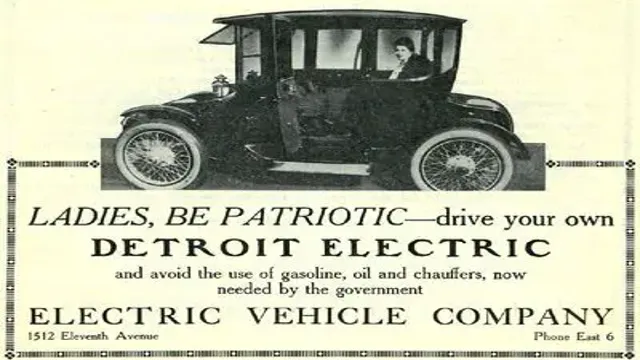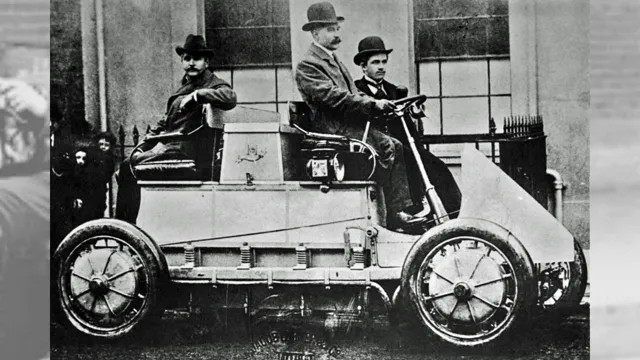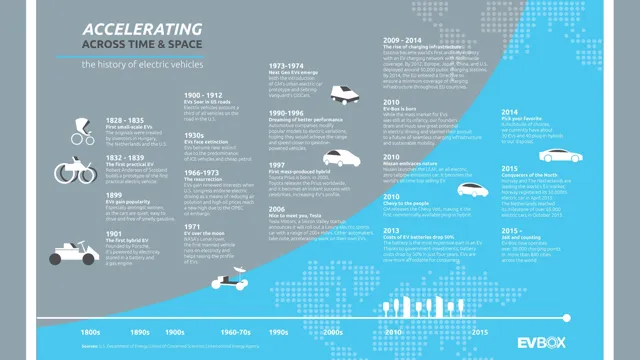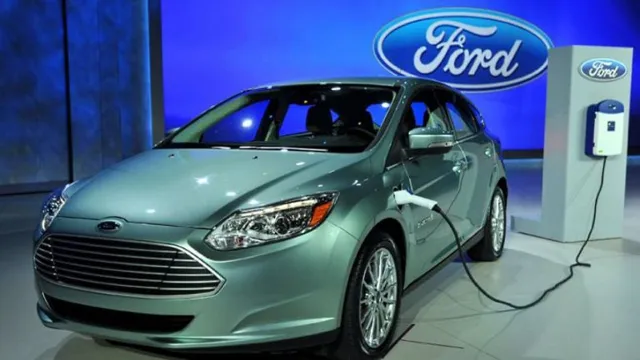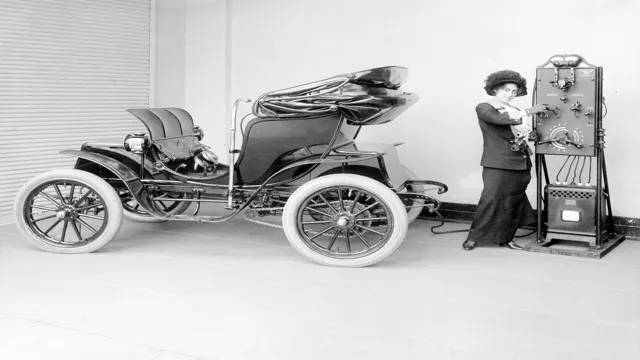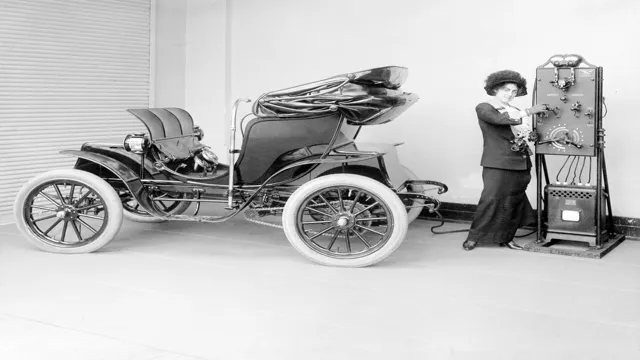Revolutionizing the Road: Exploring the History of Electric Cars on Energy.gov
Electric cars have come a long way since their inception more than a century ago. With the advancement of technology and increasing concerns about the environment, the electric car industry is growing rapidly. The evolution of electric cars has been fascinating; from being crude and inefficient to having sleek designs, high-end performance, and long ranges capable of rivalling their gasoline counterparts.
These developments demonstrate that electric cars are no longer a novelty; they are an increasingly viable option that has the potential to change the way we commute forever. One of the most significant events that paved the way for electric cars was the introduction of Tesla’s Roadster in 200 It was the first mass-produced electric sports car and proved that electric vehicles could be both aesthetically pleasing and powerful.
Ever since then, the electric car industry has grown at an unprecedented rate, with more and more companies launching newer and better models each year. The main advantage of electric cars is their environmental impact. They are significantly more eco-friendly than gasoline cars, producing zero emissions.
As a result, they help reduce air pollution and decrease our dependence on fossil fuels. Another great benefit is the cost savings in the long run. Though the initial cost of purchasing an electric vehicle can still be a bit pricey, the running and maintenance costs are much lower than that of a traditional gasoline-powered car.
Moreover, as the technology develops and demand for electric cars increases, prices will only continue to fall. In conclusion, the evolution of electric cars has come a long way with numerous advancements in the technology and design of EVs. Electric cars transformed from being a curiosity to being an actual replacement option for traditional gas cars.
With the modern-day focus on climate change and alternative energy sources, the future for electric cars looks bright.
History of Electric Cars
Looking back at the history of electric cars, it’s interesting to see how far they’ve come. According to Energy Gov Articles, the electric car was actually invented before the gasoline-powered car! In the early 1800s, inventors began experimenting with electric vehicles, but they weren’t practical for mass production due to their limited range and high cost. It wasn’t until the late 19th century that gasoline cars began to take over, thanks to advancements in technology and the discovery of oil reserves.
However, interest in electric cars continued, and they experienced a surge in popularity in the early 2000s due to concerns about pollution and climate change. Now, electric cars are becoming more and more sophisticated, with longer ranges and faster charging times, making them a viable option for many drivers. It’s exciting to think about what the future holds for electric cars, and how they will continue to evolve and change the automotive industry as we know it.
From Early Beginnings to Today’s Models
The history of electric cars dates back to the early 19th century when inventors began to experiment with electric power as an alternative to gas-powered vehicles. The first successful electric car was developed in the late 1800s, during a time when gasoline engines were still in their infancy. But it wasn’t until the late 20th century that electric cars began to gain popularity again due to advancements in battery technology and increased concern for the environment.
Today, electric cars come in a variety of models with varying ranges and capabilities, from affordable compact vehicles to luxury sports cars. With the increasing focus on reducing carbon emissions and moving towards a more sustainable future, electric cars look to be a crucial part of the transportation industry for years to come.
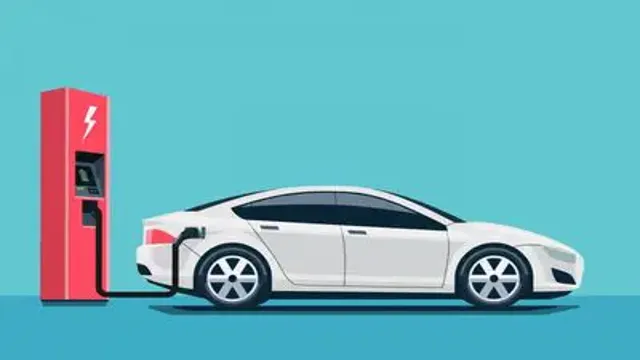
Factors Driving Electric Car Innovation
When we think of electric cars, we typically imagine a modern innovation of the 21st century. But the truth is that electric cars have been around for more than a century. The first electric car was built in the late 1800s, and by the turn of the 20th century, they were popular among the wealthy.
However, the invention of the gasoline engine and the widespread access to fuel made electric cars impractical for everyday use. In recent years, a combination of factors, including concerns over climate change, advancements in battery technology, and government incentives, have spurred a resurgence in electric car innovation. Today’s electric cars are more efficient, have longer battery life, and are becoming more affordable for the average consumer.
As a result, electric cars are becoming an increasingly popular option for drivers who want to reduce their carbon footprint and save money on fuel costs.
Government-Supported Electric Cars
Looking back at the history of electric cars in the United States reveals a story of both hope and disappointment. The government has supported electric vehicles (EVs) for decades, with various initiatives aimed at promoting their use. One notable example was the Electric and Hybrid Vehicle Research, Development, and Demonstration Act of 1976, which was designed to boost EV technology and encourage more widespread adoption.
However, despite these efforts, consumer demand remained low due to a combination of factors such as high prices, limited range, and lack of charging infrastructure. In recent years, there has been a renewed, stronger push towards EVs as a way to fight climate change and reduce dependence on foreign oil. Today, the energy.
gov website has many articles about the benefits of EVs, as well as information on how the government is working to make them more accessible and affordable for all.
Government Incentives for Electric Car Adoption
If you’re thinking about upgrading to an electric car, there’s never been a better time to do so. Many governments around the world are offering financial incentives to encourage drivers to switch to electric vehicles. These incentives can come in a variety of forms, such as tax credits, rebates, and subsidies.
In some areas, there are even programs that provide free charging stations to electric car owners. These government-supported measures may seem small, but they can make a significant difference in the affordability of electric cars, especially for those on a tight budget. By taking advantage of these incentives, you can help reduce your carbon footprint and save money on fuel costs in the long run.
Overall, there are many reasons to choose an electric car for your next vehicle purchase. Not only do they help combat climate change, but they also offer a quieter, smoother driving experience that you’re sure to love.
Energy Department’s Role in Advancing Electric Vehicles
The Energy Department is playing a crucial role in advancing the use of electric vehicles in the US. With support from the government, electric cars are becoming more accessible and affordable to the public. The department is funding research and development projects towards making electric vehicles more efficient, fast-charging and impactful on reducing greenhouse gas emissions.
They are also providing financial assistance to communities and businesses that are embracing the use of EVs. The government is committed to promoting the use of electric vehicles to reduce the country’s dependence on imported oil, cut down on emissions and improve air quality. By supporting the deployment of electric cars, the Energy Department is not only creating jobs but also encouraging innovation and paving the way to a sustainable future for all.
Biggest Federal Investments in the EV Industry
When it comes to the electric vehicle industry, the federal government has made some significant investments in recent years. The biggest of these investments has been in the form of tax credits for those who purchase electric cars. This has helped to make electric cars more affordable and accessible for average consumers.
Additionally, the government has created incentives for companies to invest in electric vehicle technologies, such as research grants and low-interest loans. This has led to the development of new and innovative electric vehicle technologies, such as longer-lasting batteries and more efficient charging systems. Overall, these investments have helped to increase the adoption of electric cars and reduce our dependence on fossil fuels, making for a cleaner and more sustainable future.
The Benefits of Electric Cars
Electric cars have come a long way since their inception, and their benefits are undeniable. Thanks to the advancements in technology, electric vehicles (EVs) now have a range and performance that can compete with traditional gas-powered cars. For starters, EVs are much more environmentally friendly as they emit significantly less greenhouse gases than gas-powered vehicles.
Moreover, they are cheaper to operate as electricity is generally cheaper than gasoline. And since electricity can be generated from renewable sources like solar and wind, it’s a win-win for the planet and your wallet. Additionally, electric car maintenance is simpler as there are fewer moving parts and no need for oil changes.
It’s also worth mentioning that EVs are quieter and smoother compared to traditional cars, providing a more comfortable ride. In conclusion, with the increasing focus on reducing carbon emissions, the future of transportation seems to be towards electric cars.
Sustainability and Energy Efficiency
Electric cars are becoming increasingly popular due to their many benefits. They are a sustainable and energy-efficient mode of transportation that can help reduce air pollution, lower greenhouse gas emissions, and improve local air quality. Electric cars are powered by electricity, which means that they don’t produce harmful emissions like traditional gasoline-powered cars.
This is one of the main reasons why they are considered to be a more environmentally friendly option. Another benefit of electric cars is their low maintenance and operating costs. They have fewer moving parts than traditional cars, which means that they require less maintenance and repairs over time.
Additionally, electric cars are more efficient than gasoline-powered cars, which means that they can travel further on a single charge. All of these benefits make electric cars a great choice for anyone looking to reduce their carbon footprint and save money on transportation costs.
Cost Savings Over Time
Electric cars are becoming more and more popular these days, and for good reason. Besides being environmentally friendly, they can also save you a lot of money in the long run. Though the upfront cost of purchasing an electric car may seem steep, you’ll likely make up for it through savings on fuel, maintenance, and repair costs over time.
Studies have shown that electric cars are significantly cheaper to maintain than traditional gasoline-powered cars, as they require fewer oil changes, have fewer moving parts that can break, and do not need things like exhaust systems. Additionally, electric cars can save you money on fuel costs, as the cost of electricity is typically lower than the cost of gasoline on a per-mile basis. Overall, while buying an electric car may require an initial investment, the cost savings over time can make it well worth it.
Future of Electric Car Industry
The electric car industry has come a long way since its inception, as detailed on energy.gov articles history electric car. Early electric cars struggled to gain a foothold, facing challenges like limited driving range and high costs.
However, with the advancement of battery technology and the push for sustainable energy, electric cars are now more popular than ever. The future of the electric car industry looks bright as more and more companies announce plans for electric car production and infrastructure. With the increasing availability of charging stations around the world, electric cars are becoming a more practical option for consumers looking to reduce their carbon footprint.
Government incentives and regulations aimed at reducing emissions are also expected to boost the electric car industry. As the industry continues to grow, we may see even more innovations, such as longer driving ranges and faster recharge times. Overall, the future of the electric car industry is looking very promising as technology improves and society shifts towards a more sustainable future.
Conclusion
In the history of the electric car, we’ve seen moments of innovation and excitement followed by periods of dormancy and disappointment. But as we look toward the future, it’s clear that electric cars are no longer just a novelty – they’re an essential piece of the puzzle in addressing climate change and creating a more sustainable world. With advancements in battery technology, charging infrastructure, and consumer attitudes, the electric car is poised to become the driving force of the 21st century.
So, let’s rev up our engines and take a bold step forward into a brighter, greener, and electrified future!”
FAQs
What government policies promote the use of electric cars and renewable energy?
There are a variety of government policies that promote the use of electric cars and renewable energy, including tax incentives, mandates for renewable energy production, and regulations on emissions from traditional combustion engines.
How has the history of the electric car evolved over time?
The history of the electric car dates back to the 19th century, when electric vehicles were some of the first automobiles. In the 20th century, electric cars saw a decline in popularity as gasoline engines dominated the market, but they have recently made a comeback due to concerns about climate change and improvements in battery technology.
What are some recent articles on advancements in electric car technology?
Recent articles on advancements in electric car technology have covered topics such as longer battery life, faster charging times, and the development of alternative power sources such as hydrogen fuel cells.
How do government policies and industry trends impact the growth of renewable energy and electric cars?
Government policies and industry trends play a major role in shaping the growth of renewable energy and electric cars. For example, policies that incentivize the use of renewable energy and electric cars and regulations that limit emissions from traditional engines can help drive adoption, while trends such as improvements in battery technology can make electric cars more practical and appealing to consumers.

